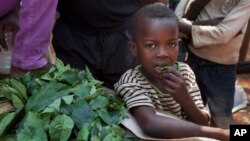GENEVA, SWITZERLAND —
The United Nations Children's Fund (UNICEF) reports it is scaling up emergency operations for thousands of needy children in the Central African Republic (CAR). UNICEF says weeks of conflict in the CAR have affected 1.8 million people, with 800,000 in urgent need of humanitarian assistance.
The U.N. Children's Fund reports children comprise about half of the 800,000 people in need of urgent assistance. It says the humanitarian consequences of this latest crisis in the Central African Republic are still being assessed. But, as in all crises, it says children here too are paying the heaviest price.
Armed rebel groups rose up against the country's President, Francois Bozizi, in mid-December. The rebel coalition Seleka signed a peace deal with the president on January 11.
UNICEF spokeswoman, Marixie Mercado says some of the hardest hit areas include N'dele, Bria, Bombari, and Kaga Bandoro - all towns that remain in rebel hands. She says children there are living in extremely precarious conditions and are in need of immediate assistance.
"For children, major risks include recruitment into armed groups and sexual violence," she said. "But, in a country that is as poor as the Central African Republic where access to basic services is so precarious, the risk of epidemics, of diarrhea, of malaria is very, very high. UNICEF is doing all it can with partners to restart services in the areas where for now, public services have just shut down."
The CAR is one of the poorest countries in the world. It has the ninth highest rate of child mortality in the world. UNICEF reports eight percent of children aged 6 to 59 months suffer from moderate acute malnutrition and 1.9 percent with severe acute malnutrition.
In conflict-affected areas, the agency says fewer than half of the children are enrolled in school. It says new recruitments of children are taking place. UNICEF's Mercado says both the rebels and pro-government militias are recruiting children as soldiers.
"Even before the conflict started, we estimated that there were about 2,500 children associated with armed groups in the country," she said. "Recruitment is a huge concern and we are doing what we can with partners to make sure that everybody is aware of this risk and that families are prepared. We have worked in the country on releasing and re-integrating former child soldiers since 2007, with thousands of children released since then."
With the situation stabilizing in the country, UNICEF says the agency aims to reach communities that previously were inaccessible with essential aid. It says it aims to provide emergency water and sanitation, nutrition assistance, medicine and hygiene for families uprooted by the crisis.
It says other priorities include education and protection for children threatened with child trafficking, sexual exploitation and child recruitment.
The U.N. Children's Fund reports children comprise about half of the 800,000 people in need of urgent assistance. It says the humanitarian consequences of this latest crisis in the Central African Republic are still being assessed. But, as in all crises, it says children here too are paying the heaviest price.
Armed rebel groups rose up against the country's President, Francois Bozizi, in mid-December. The rebel coalition Seleka signed a peace deal with the president on January 11.
UNICEF spokeswoman, Marixie Mercado says some of the hardest hit areas include N'dele, Bria, Bombari, and Kaga Bandoro - all towns that remain in rebel hands. She says children there are living in extremely precarious conditions and are in need of immediate assistance.
"For children, major risks include recruitment into armed groups and sexual violence," she said. "But, in a country that is as poor as the Central African Republic where access to basic services is so precarious, the risk of epidemics, of diarrhea, of malaria is very, very high. UNICEF is doing all it can with partners to restart services in the areas where for now, public services have just shut down."
The CAR is one of the poorest countries in the world. It has the ninth highest rate of child mortality in the world. UNICEF reports eight percent of children aged 6 to 59 months suffer from moderate acute malnutrition and 1.9 percent with severe acute malnutrition.
In conflict-affected areas, the agency says fewer than half of the children are enrolled in school. It says new recruitments of children are taking place. UNICEF's Mercado says both the rebels and pro-government militias are recruiting children as soldiers.
"Even before the conflict started, we estimated that there were about 2,500 children associated with armed groups in the country," she said. "Recruitment is a huge concern and we are doing what we can with partners to make sure that everybody is aware of this risk and that families are prepared. We have worked in the country on releasing and re-integrating former child soldiers since 2007, with thousands of children released since then."
With the situation stabilizing in the country, UNICEF says the agency aims to reach communities that previously were inaccessible with essential aid. It says it aims to provide emergency water and sanitation, nutrition assistance, medicine and hygiene for families uprooted by the crisis.
It says other priorities include education and protection for children threatened with child trafficking, sexual exploitation and child recruitment.










